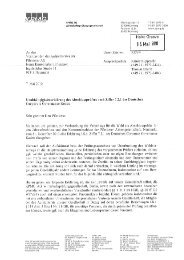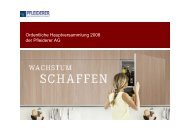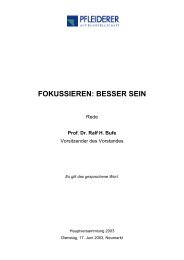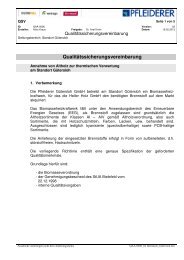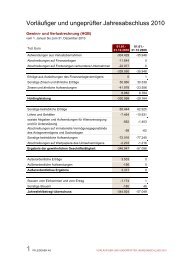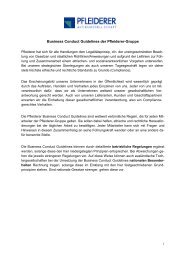PDF, 1.2 MB - Pfleiderer AG
PDF, 1.2 MB - Pfleiderer AG
PDF, 1.2 MB - Pfleiderer AG
Create successful ePaper yourself
Turn your PDF publications into a flip-book with our unique Google optimized e-Paper software.
14 being focused: being better<br />
management report<br />
market report<br />
Development of the Economy as a Whole<br />
The world economy recovered slightly at the beginning of 2002 having apparently overcome<br />
the effects of September 11, 2001, only to fall back to another low point during the summer.<br />
According to the German “Ifo World Economic Climate Index”, by December 2002 economic<br />
activity had almost returned to the same low level of autumn 2001. The threat of war with Iraq,<br />
increasing oil prices and unusually big declines in share prices on international markets all<br />
played a part in weakening the global economy.<br />
In the USA, real GPD grew in 2002 by around 2.5 percent. And while fears of a double<br />
dip in the summer of 2002 proved misplaced, the economy clearly lost impetus again during<br />
the fourth quarter. As in the previous year, private consumption proved the mainstay for<br />
economic demand. However, unemployment rose to an average 5.75 percent, while debt levels<br />
among private households grew considerably. Nevertheless, consumption did increase in the<br />
wake of fiscal policy measures, and even private house construction picked up – a development<br />
not reflected in the commercial construction sector.<br />
Following the low at the end of 2001, the economies in the member states of the European<br />
Monetary Union improved slightly, although production only increased very slowly by<br />
0.8 percent. However, developments forecast in the spring failed to materialize. On average,<br />
the euro gained around 5 percent on the dollar in 2002, moving up by around 13 percent<br />
during the course of the year. On the other hand, the euro weakened against the currencies of<br />
central and eastern Europe. Private consumption was stronger, but demand for capital goods<br />
declined.<br />
After the dip at the end of 2001, the German economy stabilized during 2002, although<br />
no real upturn took hold. According to the “Ifo Institute”, real GDP growth is expected to<br />
reach no more than around 0.2 percent, even though the starting point in 2001 was very low.<br />
Weak domestic demand, down by around 1.3 percent on the yearly average, is the main cause<br />
for the current poor economic performance. Capital expenditure in the construction sector<br />
fell back by 5.7 percent in 2001. In view of the fall in real income due to lower levels of<br />
employment and slightly increased savings rates, consumer demand – the driving force for the<br />
manufacturing sector – declined by 0.5 percent in 2002.





